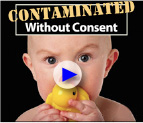Contact: Coming Clean, (802) 251-0203, info@comingcleaninc.org
January 27, 2011
Ban Toxic BPA: Environmental Health Groups Support New Bills in Congress
Senator Feinstein, Representative Markey Introduce Bills to Protect Children from Synthetic Sex Hormone
(Washington) Environmental health advocacy groups concerned with toxic chemicals in food and beverages applaud Senator Diane Feinstein and Representative Edward Markey, who both introduced bills this week to limit hormone-disrupting chemical bisphenol A in baby bottles, sippy cups and food and beverage containers.
"Congressman Markey deserves our thanks today for his leadership in pressing forward to phase out BPA in food and beverage containers," said Cindy Luppi, New England Co-Director for Clean Water Action. "With other countries around the globe taking steps to protect children and pregnant women from contact with BPA, the U.S. risks falling behind on this public health imperative."
“Hundreds of animal studies show strong links between BPA exposure in early life and obesity, diabetes, neurodevelopmental effects and cancers. Recent studies also suggest that this chemical affects human fertility, cardiovascular disease, and is linked to behavioral problems in children, all of which are serious problems plaguing the US,” says Dr. Laura Vandenberg of Tufts University. “We know enough about the negative effects of this chemical to justify action now.”
“The market for products that are BPA-free has virtually exploded because of rising consumer awareness about this ubiquitous hormone disruptor,” says Mia Davis from the National Workgroup for Safe Markets, an author of the report, No Silver Lining: An Investigation into Bisphenol A in Cans.
“Seven states have already restricted BPA in food packaging, and another 18 are considering following suit,” said Janet Nudelman at the Breast Cancer Fund. “It’s just common sense that Congress would create a national standard that would protect all of us — regardless of what state we live in—from this hormonally active chemical linked to breast cancer.”
“Toxic chemicals like BPA don’t play party politics, so it’s no surprise that parents of all political perspectives want their children protected ,” said Bobbi Chase Wilding, mother of two with Clean New York. “It’s time the US joins other nations like Germany, France, and Canada and takes action to remove BPA from products used by babies and toddlers.”
“This is very important legislation in ensuring that all women, regardless of their socioeconomic status, have direct access to safer products. A dual market was being created in which BPA-free products were only available in larger stores, often located in more well-resourced communities. Lack of access to information, and low availability of BPA-free products in smaller corner stores meant that low-income consumers with limited mobility didn’t have access to safe products for their family,” comments Martha Dina Arguello, Executive Director of Physicians for Social Responsibility – Los Angeles.
“When the American Chemistry Council came in and derailed Sen. Feinstein’s amendment to the Food Safety Act that would have protected infants and toddlers from BPA in their food, Dow Chemical, Exxon, and other corporations who give generously to Congressional campaigns won out over our children’s health. We’ll be watching the Congressional response to these bills.” Says Public Health Advocate for U.S. PIRG, Elizabeth Hitchcock.
Urvashi Rangan, Ph.D., Director, Technical Policy for Consumers Union, says, “There have been enough product testing studies demonstrating evidence of BPA exposure, coupled with scientific studies linking this exposure to health effects, it is clear that protection for our children from this chemical is long overdue.”
Physicians, nurses, and health care professionals are seeing more and more illnesses in their patients related to endocrine disruption, a clear result from the ubiquitous rise of chemicals such as bisphenol A in our environment and in our bodies,” explains Kristen Welker- Hood, ScD MSN RN, Director of the Environment and Health Program at Physicians for Social Responsibility in Washington DC. “Congress must step forward to stop this urgent health issue impacting so many, especially children.”
Elizabeth Crowe, Director of the Kentucky Environmental Foundation reports, “We look forward to supporting bipartisan efforts to protect us here in Kentucky and in the nation from toxic chemicals such as bisphenol A. We know voters here from all over the political spectrum are looking to our legislators to advocate on behalf of the health of our children.”
BPA is one of the most widely used chemicals of all time – about six billion pounds of BPAare produced each year worldwide. It is used to make baby bottles and sippy cups, clear plastic toys, food can linings, sports water bottles, dental sealants, receipt paper, eye glasses and many other products. 93% of Americans have BPA in their bodies, according to the CDC, and other studies have found that children, particularly newborns, have higher levels of BPA than adults.
During the past decade, an explosion of research has explored the connections between BPA exposure — particularly before birth and in early childhood — and the health problems that are increasingly afflicting U.S. residents.In particular, exposure to BPA before birth has been found in laboratory studies to predispose animals to cancer; alter brain development; and lead to early puberty in females.Males exposed in the womb produce less testosterone, have larger prostate glands, and make fewer sperm than unexposed animals. Studies have also shown a correlation between BPA and obesity, diabetes and cardiovascular problems.
Available for Interviews
Bobbi Chase Wilding, Organizing Director, Clean and Healthy New York, mother of two and BPA Coordinator, National Workgroup for Safe Markets, 518-708-3875.
Mike Schade, Center for Health, Environment and Justice. 212-964-3680. Mike can address retailers pulling BPA products from their shelves and changes with manufacturers.
Mia Davis, former BPA Coordinator for Clean Water Action, Co-Coordinator, Workgroup for Safe Markets 617-338-8131, x201.
Janet Nudelman, Director of Program and Policy at the Breast Cancer Fund. To schedule an interview, please contact Shannon Coughlin, 415-336-2246.
Naomi Starkman, Consumers Union, to contact Urvashi Rangan, Ph.D., Director, Technical Policy for Consumers Union and for Consumer’s Union BPA in cans report information: 917-539-3924.
Elizabeth Crowe, Director, Kentucky Environmental Foundation, 859-986-0868.
Chloe Schwabe, Assistant Director for Environmental Health, National Council of Churches, 202-549-1696.
Martha Dina Arguello, Executive Director, PSR-LA, 213-689-9170. Martha can address efforts in California state legislature to restrict BPA, and impacts on communities of color.
For More Information
- Feinstein Introduces Bill to Ban BPA in Young Children's Products
- Markey Calls for 100% Ban on BPA in Food & Beverage Containers
- Avoiding BPA Tip Sheet, National Work Group for Safe Markets
- Baby’s Toxic Bottle, Center for Health, Environment & Justice
- No Silver Lining: An Investigation into bisphenol A in cans National Work Group for Safe Markets
- Consumer’s Union BPA in Cans report
- Breast Cancer Fund on BPA
# # #




